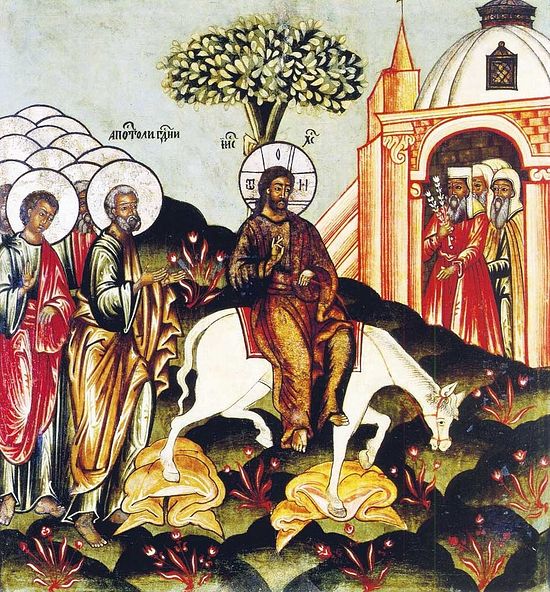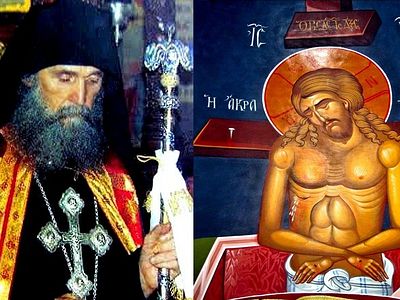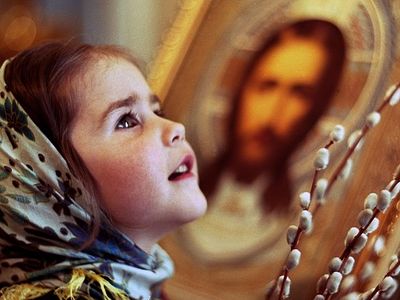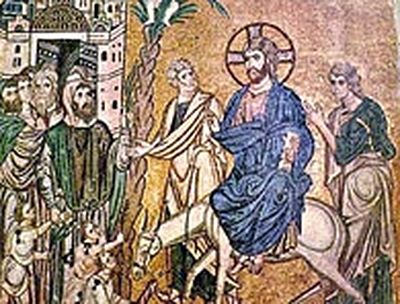The Matins Magnification: “We magnify Thee, O Christ the Giver of Life: Hosanna in the highest! And we cry aloud to Thee: Blessed is He who cometh in the name of the Lord.”
“Having Beheld the Resurrection of Christ” is not sung. Pussy willows are blessed, which is why it’s called Pussy Willow Sunday among the people.
These are some of the features of the feast at the All-Night Vigil.
At the Entrance at the Liturgy: “Blessed is he that cometh in the name of the Lord. We have blessed you out of the house of the Lord. God is the Lord, and hath appeared unto us.” The Gospel tells us about the donkey that was appointed for the Lord. They brought a donkey and a young colt and laid their clothes on them, and He sat on top of them. Many people spread their clothes out along the road, and others cut branches and spread those along the path. The people cried out, Hosanna to the Son of David: Blessed is he that cometh in the name of the Lord; Hosanna in the highest.
When He entered Jerusalem, the whole city was set in motion, saying, “Who is this?”
During the Liturgy, the Gospel tells us about a supper prepared for Christ. Lazarus was there, whom Christ resurrected from the dead. Martha was there, who served, but Lazarus was one of those reclining at the supper. Mary took a pound of pure spikenard, a precious oil, anointed the feet of Jesus Christ, and wiped them with her hair, and the house was filled with the fragrance. Judas Iscariot became indignant and said, Why was not this ointment sold for three hundred pence, and given to the poor? He said this because, as the Gospel notes, he was a thief. Jesus interceded for Mary and said, Let her alone: against the day of my burying hath she kept this. This was in Bethany, and all the people began to flock there. The chief priests planned to kill Lazarus together with Christ, because on account of him many believed in Christ. The next day after the supper the Lord went to Jerusalem. The people enthusiastically greeted Christ, coming on a donkey.
That is how the Gospel describes the Lord’s entrance into Jerusalem.
We have here: a supper, Lazarus at the supper with Christ, Martha serving, Mary wiping Christ’s feet with her hair, enthusiastic people and the chief priests, and Judas plotting a treacherous murder.
This was twenty centuries ago. Now we have the solemn service, and here we are with branches. This is the external side. The internal is concealed within the All-Night Vigil. Christ knows that His hour is near, when these rapturous people, praising Him thusly, will soon cry out, “Crucify, crucify!” And as their delight was hard to contain, so was their rage. But while everything is festive, the earthly affair is finished, having reached its climax: “Hosanna in the highest!” And we cry aloud to Thee, “Blessed is He who cometh in the name of the Lord. We magnify Thee, O Christ the Giver of Life.” Christ is coming. The most difficult and crucial time awaits us—Holy Week, with the suffering on the Cross, the Crucifixion… Only with the awareness that it will be very difficult ahead, is it possible to reject earthly glory, which all people have such a penchant for. Christ does not need earthly glory; He shows us that it is not necessary, because we all have before us our final suffering and death. Who will resurrect, who will attain the resurrection from the dead—no one knows. We stand before such earthly glory, after which comes suffering, and, enduring suffering, a man receives heavenly glory.
What does all this say to us, gathered in this church of God? Our life now is so bare, that all is clearly visible and everything is understood. But what do we understand? Let us reflect upon this a little. After all, this is not limited for us to just one service. A service is a service when our life corresponds to that service… If we cling to earthly blessings and greatness, then our service, fulfilling outward forms, is followed by all sorts of criminal activity, and we find ourselves on the side of the enemies of God. Or, if we need nothing earthly, and everything that we do is for heaven, then our service is as incense, uplifting us to Heaven… We live on earth, but everything for us is in Heaven…
What does the Entrance of the Lord into Jerusalem tell us? Look at the branches in your hands, and think about what they mean for us. Christ is coming. For modern people, accustomed to traveling around in all kinds of comfortable cars, entrance on a donkey can seem even funny. We are proud of our conveniences, and from this comfort we ruin the brotherly relationship between ourselves. The donkey is kind of a joke to us. That is, if you look at the outside, and the inside, how much the car costs, the petty egotistical feelings, empty pride, and if you look even closer, and you drive faster and faster—and suddenly one unlucky turn, and everything goes flying, is smashed into smithereens, nothing remains of this earthly glory but a pile of wreckage from the car… Funny, and sad, and bitter, and painful, and a pity. Let’s turn off everything and look at the Entrance of the Lord into Jerusalem with all seriousness.
The Lord is coming, Lazarus is resurrected, Martha serves, Mary wipes his feet, and the people are flocking to welcome Christ.
There they’re so freely and nonchalantly standing around—what do you think of it? Yesterday you offended someone else, and deceived them, and what do you think of it? Is not the betrayal of Judas in your deceit?
And there is a woman, bitterly weeping for her children, and we might not pay any attention to her, and don’t you think that her tears are the myrrh on Christ’s feet? And there are people standing there—what are they planning? If they can carry out their plan, it won’t be good for them.
And where was Lazarus, whom Christ resurrected, who, despite all the dead atmosphere, came out of the grave? The world is old in all its affairs, as it was then, so it is now. The Lord enters into Jerusalem; the donkey’s footfall should be heard in our ears. What kinds of feelings does all this induce in us? Let’s take note that, although today is a day of resurrection, “Having Beheld the Resurrection of Christ”[1] is not sung; but branches are blessed. Branches are the shoots of a tree. When branches blossom, the tree lives. To resurrect our souls, it is necessary to sing the virtues in them. Blessed is he that cometh in the name of the Lord. Only in the Highest, only in Heaven is there true celebration; on earth there can be suffering after a celebration.
Today we solemnly serve, and tomorrow we will say, “May He Who is going to His voluntary Passion for our salvation...”[2] Everything that God does is for our salvation, but we must not remain indifferent. Without us, as they say, God will not save us. What is required of us?
The Entrance of the Lord into Jerusalem is the Lord’s entrance into this Church, small, not able to accommodate many, but many would like to come in here, and we are happy that we wound up here, near to the Lord arriving on a donkey.
The donkey is a docile animal; it can symbolize people who obediently fulfill the will of God, who offer their backs to the Lord: “Thy will be done, O God.”
The Entrance of the Lord into Jerusalem is the Lord’s entrance into every one of our homes. Just imagine, how would you react if the Lord appeared in your home?
The Entrance of the Lord into Jerusalem is the Lord’s entrance into our souls. Imagine that the Lord has come into our souls. What does His entrance into our souls mean?
What does the entrance of the Lord mean in general? It means the continuation of the Lord’s path for the sake of our salvation. All the earthly things that are necessary to do, the Lord did. Now these earthly things must be anchored, which can happen only through suffering. Entering into Jerusalem, the Lord goes to His suffering. Today we greet the festive entrance of the Lord, all rejoicing, holding in our hands branches as a sign of welcome, and how we will follow Him tomorrow. Tomorrow He already heads for His suffering, and will we follow after Him? We are ready to rejoice in glory, but here in ignominy and suffering, will we rejoice? Meanwhile, as Christians we often repeat that punishment and suffering are the grace of God, but we do not always implement this in life. Moreover, believing this, we suddenly reject the Lord when trials come.







